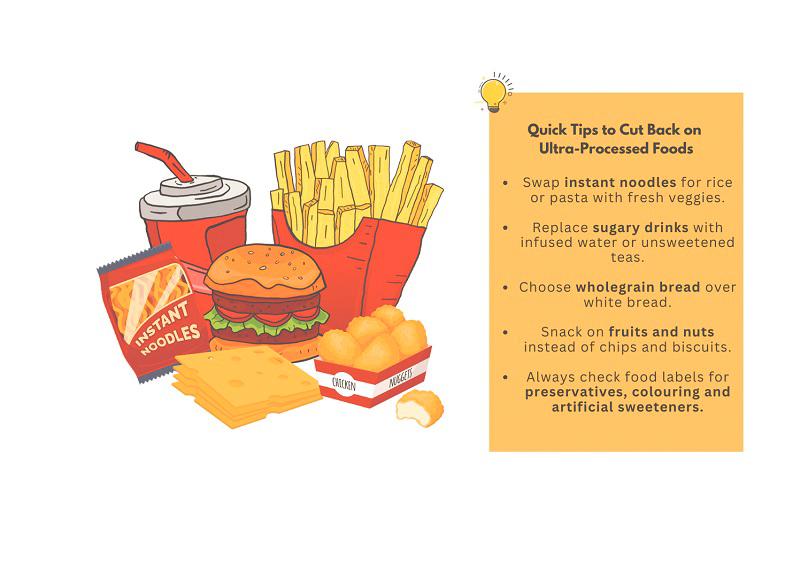PETALING JAYA: That steaming cup of instant noodles, colourful fizzy drink or the snack you grabbed at the petrol station are all fast, cheap and tasty foods. But they may also be fuelling a slow, silent epidemic in Malaysia.
Information on the Health Ministry Institute for Public Health website indicates that millions of adults are living with chronic conditions.
The data indicates that 15.6% of the adult population (one in every six individuals) have diabetes, with two in five unaware of their condition. Nearly one in three adults (29.2%) live with hypertension and over 33% have high cholesterol, half of whom remain undiagnosed.
More than 2.3 million adults suffer from a combination of three major non-communicable diseases (NCD), while over half a million are managing all four – diabetes, hypertension, high cholesterol and obesity.
Universiti Malaysia Terengganu Food Technology Programme lecturer Assoc Prof Dr Mohamad Khairi Mohd Zainol said the convenience of modern food is contributing to a growing health crisis, one that is deeply connected to our everyday diet.
“Processed foods are no longer just occasional additions to our meals. They have become the core diet for many Malaysians and this shift is dangerous.”
He said while not all processed foods are harmful, as canned vegetables, yogurt and packaged bread can retain much of
their original nutritional value,
ultra-processed foods (UPF) are a different matter.
This category includes instant noodles, sugary drinks, processed meats and colourful snacks, which are industrially formulated with additives, emulsifiers and artificial flavouring to enhance taste and prolong shelf life.
“These foods are calorie-dense but nutritionally poor. They are high in sugar, salt and unhealthy fats, yet low in fibre, protein and essential vitamins.”
Excessive consumption of UPF has been linked to obesity, diabetes, heart disease, certain cancers and even depression.
“Even when people think they’re making harmless food choices, they may be unknowingly consuming a cocktail of chemicals that carry long-term health risks,” Mohamad Khairi said.
He highlighted several concerns, including MSG, which is said to trigger headaches or palpitations and has been linked to hypertension and metabolic disorders.
Nitrates and nitrites in processed meats can convert into nitrosamines, which are classified by the World Health Organisation as probable carcinogens.
Artificial sweeteners such as aspartame and sucralose, commonly found in “sugar-free” products, have been linked to gut disruption and heart disease risks.
Synthetic food colouring, such as Tartrazine and Allura Red, have raised concerns for their potential link to hyperactivity in children.
Preservatives that include sodium benzoate and BHA/BHT, although legal, are flagged for potential cancer and hormone-related issues.
“These additives are allowed under Malaysian food regulations, but the concern lies in cumulative exposure. Just because it is permitted does not mean it is safe in the amounts people consume daily,” Mohamad Khairi added.
“There is strong scientific evidence linking frequent consumption of processed meats, sugary drinks and refined carbs to NCD. Yet, these are everyday staples in many homes.”
He cited global studies showing that just one or two sugary drinks a day could increase the risk of diabetes by 26%, while eating 50g of processed meat daily can raise the risk of heart disease by 42%.
He said continued reliance on unhealthy foods stems from “convenience, affordability and aggressive marketing”.
With over 78% of Malaysians living in urban areas, fast-paced lifestyles make ready-to-eat and instant options the default, especially for time-starved B40 and M40 families.
According to Mohamad Khairi, marketing plays a significant role, particularly among children.
“Colourful packaging, mascots and jingles condition kids to crave these foods.”
While the Health Ministry regulates food additives under the Food Act 1983 and Food Regulations 1985, Khairi stressed that enforcement alone would not change public behaviour.
“What we need is awareness. Reading food labels, understanding what goes into our meals and choosing whole, fresh ingredients whenever possible can protect us from a future burdened by disease.
“Eat real food, not food-like products. Your future self will thank you,” he added, urging Malaysians to be more mindful of their food choices.









